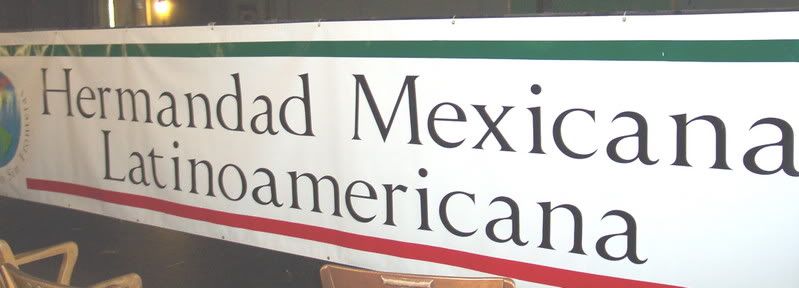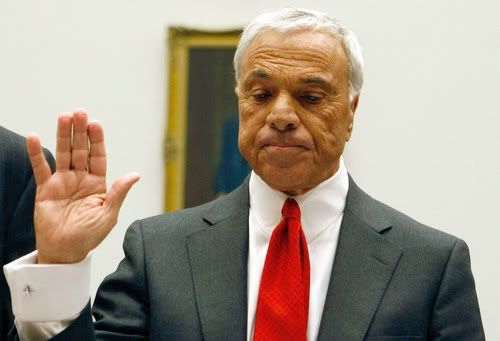RELEASE
Tuesday, March 26, 2008
For Immediate Release
MAPA and HML Applauds Los Angeles City Council on Immigration Resolution but Calls for Action on Stopping Raids
MAPA and HML call for immediate action opposing local raids against the work place and neighborhoods: Eliminate impounding of vehicles for no driver’s license; Declare Los Angeles a Sanctuary City; and Issue municipal IDs to any resident desiring one
Los Angeles, CA. The Mexican American Political Association (MAPA) and the Hermandad Mexicana Latinoamericana (HML) applaud the Mayor of Los Angeles, Antonio Villaraigosa, and the City Council for approving a council resolution opposing the oppressive SAVE ACT and the general declaration of opposition to enforcement-only measures by the federal government.
“This is a good start but more urgent action is required by city leaders,” declared Nativo V. Lopez, National President of MAPA and HML.
The local elected leadership of Los Angeles can do much more to protect its residents against invasive enforcement action by the Bush administration at both work-places and neighborhoods. In February 2008, the Immigration and Customs Enforcement (ICE) raided the Van Nuys-based computer company Micro Solutions Enterprises and arrested 140 workers and illegally detained dozens of others against their will. This is the type of raids, which target work-places, displace workers, separate families, and create a state of terror in the community.
The increasingly repressive environment created by such wanton enforcement actions requires an opposing environment of protection, sanctuary, and defense for the working families that comprise our community and work-places.
MAPA and HML call upon Los Angeles’ political leadership to take the following steps to demonstrate good faith to the millions of immigrants who have chosen to live, work, pray, and education themselves in this city, and the millions of others who also claim the city of Los Angeles as their home.
1. Demand that the federal government cease and desist from any further work-place and neighborhood ICE raids, an immediate moratorium, until the U.S. Congress approves fair and humane immigration reform; City leaders should convene an urgent meeting with officials of the Department of Homeland Security, the Justice Department, and ICE to demand that no further raids such as that which occurred at Micro Solutions Enterprises recurs in Los Angeles;
2. Immediately approve a new policy to cease the impounding of vehicles simply due to the lack of a driver’s license in accordance with a Ninth Circuit Federal Court decision already very familiar to the City Council and Mayor’s office;
3. Declare the City of Los Angeles a sanctuary city, similarly as was so declared by Mayor Tom Bradley during another period of anti-immigrant hysteria, and during which Mayor Bradley demonstrated extraordinary courage and political will, and therefore, begin to create a welcoming and protective environment to immigrants;
4. Approve a policy to issue municipal I.D.s to any resident desiring or applying for one irrespective of immigration status, income, age, or homelessness circumstance as a humane and fair public policy approach contrary to the efforts by others to criminalize individuals and de-identify them out of existence due to circumstances many times not in their control.
5. Establish an office of immigrant and refugee affairs to address the myriad needs of the immigrant communities of the city from both a policy and program dimension, and approve appropriate staffing considering the billions of dollars of contributions represented by the immigrant work-force, businesses, and investments accrued to the city.
These are elementary first, but urgent, steps that the city’s political leadership must take to demonstrate good faith, will, and commitment to those who have so endowed this great city. These are steps within the jurisdictional domain of our city fathers and mothers – and not so easily deferred to the federal government, or until the federal government takes action, which in most cases becomes the new pretext to do nothing, but issue laudable platitudes or even verbal rebuke.
We are surely living in difficult times, but however any elected official may feel the heavy burden of public service on his or her shoulders, make no mistake that the weight of society’s problems are never as burdensome as those bore by the immigrants, especially those chosen by circumstances and life to be wanting of legal documentation at the moment. These are the least of these my brethren for whom we are called upon to raise our voices in unison and solidarity that really matters – the kind that changes policy and circumstances of life.
###
Nativo V. Lopez is currently the National President of the Mexican American Political Association (MAPA) and Hermandad Mexicana Latinomamericana (HML), which requires of him full-time advocacy for the civil, human, labor, and immigrant rights of Mexicans, Mexican Americans, and Latinos throughout the United States. He has dedicated his life to these causes since his years as a high school student where he founded the first student movement organization, United Mexican American Students (UMAS). He was born in Boyle Heights, Los Angeles in 1951 to Mexican American parents, and is of both eighth-generation native U.S. born and immigrant stock. Nativo met the legendary immigrant organizer, leader, and advocate, Humberto “Bert” Corona, in 1971 and worked with him in various capacities for thirty years with the organizations Center for Autonomous Social Action (CASA), Hermandad Mexicana, and MAPA. He was a lead organizer in the 2006 pro-immigrant marches and was part of the creation of the National Alliance for Immigrant’s Rights (NAIR) in Chicago, Illinois. For more information, go to http://nativolopez.blogspot.com/.
The Mexican American Political Association, an advocacy organization, was founded in Fresno, California in 1963 and has chapters throughout California. It is dedicated to the constitutional and democratic principles of political freedom and representation for the Mexican, Mexican-American and Latino people in the United States. For more information, visit the MAPA website at http://www.mapa.org/.
Hermandad Mexicana Latinoamericana (National Mexican Latin American Brotherhood), an advocacy organization for immigrants, was created in 1951 to achieve the development and integration of Latino immigrants that live in the United States. It is dedicated to improving economic and social opportunities of immigrants and their families, and maintains that a better future for children is an inalienable right. For more information, visit the HML website at http://www.hermandadmexicana.org/.








